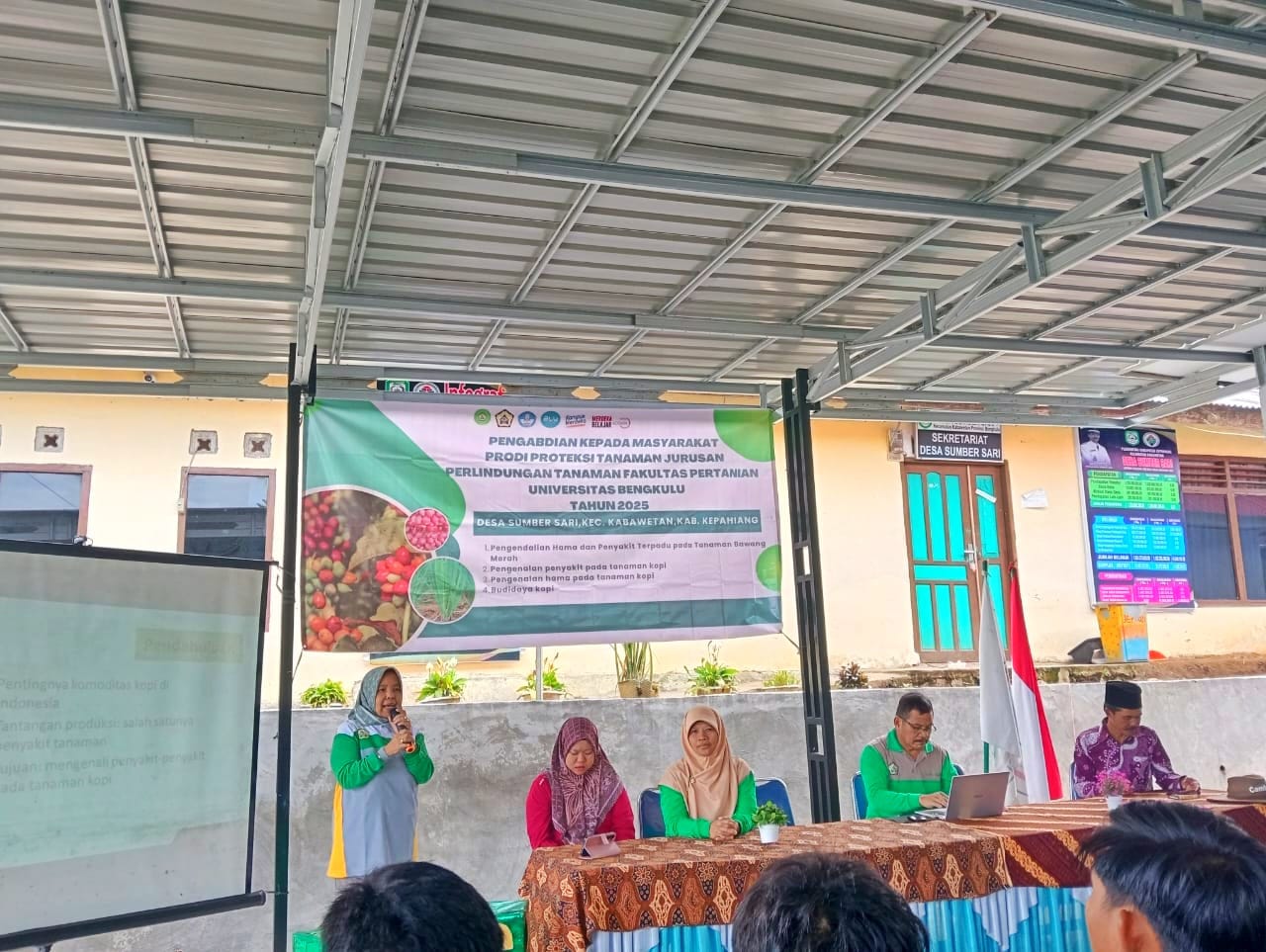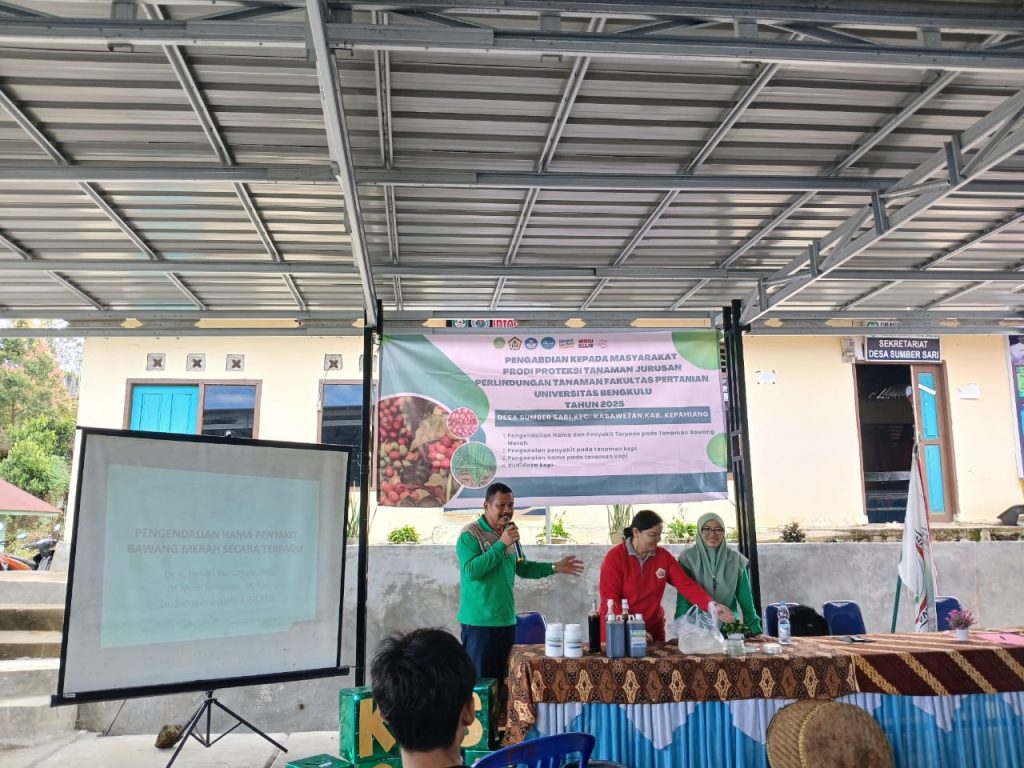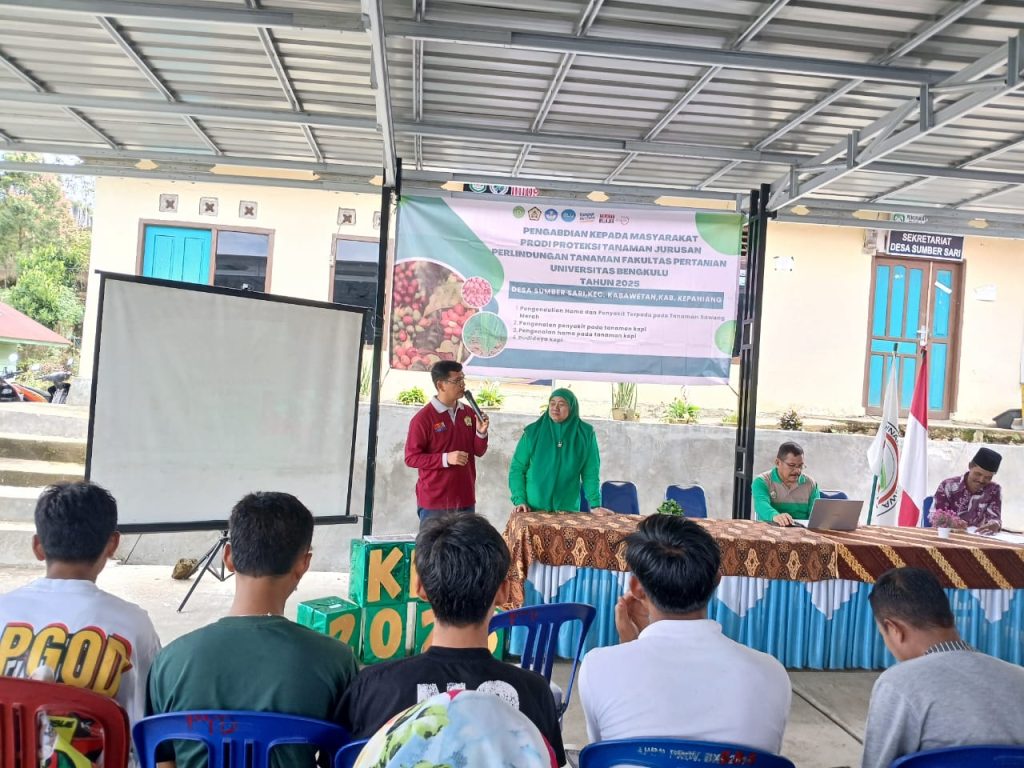
UNIVERSITY OF BENGKULU LECTURERS INTRODUCE COFFEE PLANT DISEASES TO FARMERS IN SUMBER SARI VILLAGE
Kepahiang, May 31, 2025 — As part of efforts to enhance the resilience and productivity of local coffee farming, a team of lecturers from the Department of Plant Protection, Faculty of Agriculture, University of Bengkulu, carried out a community service program titled “Introduction to Coffee Plant Diseases” in Sumber Sari Village, Kabawetan District, Kepahiang Regency, Bengkulu Province.
The activity was held on Saturday, May 31, 2025, and featured three main speakers: Dr. Ir. Tunjung Pamekas, M.Sc., Dr. Yenny Sariasih, S.P., M.Sc., and Ilmi Hamidi, S.P., M.Si. They delivered educational sessions on major coffee diseases, their causes and symptoms, and integrated management strategies for effective and sustainable control.
In their presentation, the lecturers emphasized that plant diseases remain one of the main challenges in Indonesian coffee production. Several key diseases introduced included:
- Coffee leaf rust (Hemileia vastatrix) causes yellow spots on the underside of leaves and reduces yield.
- White root fungus (Rigidoporus microporus), leading to sudden wilting and root rot.
- The leaf spot disease (Cercospora coffeicola) is marked by greyish-brown spots on young leaves.
- Sooty mold, often resulting from whiteflies or mealybugs and associated with Capnodium sp. and Meliola sp.
- Pink disease (Upasia salmonicolor) causes twig dieback and spreads through wind and rain.
- Fruit and stem rot is caused by Colletotrichum sp. and Fusarium sp., leading to fruit decay and plant death.
To mitigate these threats, participants were introduced to the principles of Integrated Pest Management (IPM), including early detection, sanitary pruning, the use of biological agents like Trichoderma and arbuscular mycorrhizal fungi (AMF), along with selective chemical and cultural methods.
“The key to disease management is early identification and an integrated approach. Farmers need to recognize the symptoms and respond promptly to sustain healthy yields,” explained Dr Tunjung Pamekas during the discussion.
The training was warmly received by local coffee farmers, who expressed hope that similar activities would continue to help them better cope with agricultural challenges, especially amid climate change and the emergence of new pathogens.
Through this initiative, the University of Bengkulu reaffirmed its commitment to bridging science and practice, strengthening collaboration between academia and farmers, and supporting a more resilient, sustainable, and competitive coffee industry in the region.
Coffee Pest Control Introduced to Farmers in Sumber Sari: Highlighting the Role of Ants in Coffee Cultivation
A team of lecturers from the University of Bengkulu conducted a community engagement activity titled “Coffee Plant Pests” in Sumber Sari Village, Kabawetan District, Kepahiang Regency, Bengkulu Province. This initiative, which took place on Saturday, May 31, 2025, educated coffee farmers on major pest threats in coffee cultivation and sustainable control methods.
The event featured presentations by Prof. Agustin Zarkani, S.P., M.Si., Ph.D, Ir. Djamilah, MP., and Deri Gustian, S.P., M.Sc. who shared their entomology and integrated pest management (IPM) expertise. One of the highlights of the discussion was the role of ants in coffee ecosystems, some species support pest outbreaks, while others serve as natural allies in pest control.
Prof. Agustin Zarkani emphasized that “certain ant species protect harmful pests like green scale insects (Coccus viridis) by harvesting their sugary secretions, creating a mutualistic relationship that exacerbates infestations. However, other ants can be beneficial by deterring or preying on pest species.”
The session introduced farmers to various major pests threatening Indonesian coffee plantations, including:
- Coffee Berry Borer (Hypothenemus hampei) is a highly destructive beetle that bores into developing coffee fruits, reducing bean quality and yield.
- Coffee Branch Borers (Xylosandrus spp.) cultivate Ambrosia fungi in coffee branches and disrupt plant health.
- Coffee Trunk Borer (Zeuzera coffeae), whose larvae bear into stems and cause upper plant parts to wilt and die.
- Green Scale Insects feed on plant sap and promote the growth of sooty mold on leaves.
Striped Mealybugs (Ferrisia virgata) attack various crops, contributing to fungal infections on coffee leaves due to sugary excretions.
The discussion underscored the importance of maintaining ecological balance in coffee gardens. “Controlling pests doesn’t mean eliminating all insects,” said Prof. Agustin Zarkani. “It’s about understanding the ecosystem and working with nature.”
This outreach program reflects the University of Bengkulu’s ongoing commitment to empowering rural farmers with scientific knowledge helping them achieve more sustainable and productive coffee cultivation practices.
Integrated Pest and Disease Management in Shallot Cultivation Introduced to Farmers in Sumber Sari
In a continuing effort to support sustainable agriculture, a team of lecturers from the University of Bengkulu conducted a community service program titled “Integrated Pest and Disease Management in Shallot Cultivation” in Sumber Sari Village, Kabawetan District, Kepahiang Regency, Bengkulu Province, on Saturday, May 31, 2025.

The program was led by Dr. Ir. Hendri Bustamam, MS, Dr. Mimi Sutrawati, S.P., M.Si, and Dr. Sempurna Ginting, SP., M.Si, who are experts in plant protection and biological control methods. Their outreach aimed to provide local shallot farmers with practical knowledge about key pests and diseases affecting shallot crops and effective and environmentally friendly control strategies.
A special focus of the training was on biological control methods, especially the use of beneficial microbes like Trichoderma spp., a well-known fungus used to suppress soil-borne pathogens and enhance plant resilience.
“Trichoderma is a natural enemy of many plant pathogens. It works by competing for nutrients and space, producing antifungal compounds, and triggering plant defense responses,” explained Dr. Hendri Bustamam. He emphasized that biological control is a key component of Integrated Pest Management (IPM), offering a sustainable and safe alternative to chemical pesticides.
The event also covered:
- Monitoring techniques to identify early signs of pest and disease outbreaks,
- Cultural practices such as proper spacing, drainage, and sanitation to reduce pest pressure,
- The combination of biological, mechanical, and when necessary chemical approaches is used to manage pest populations in a balanced and environmentally sound manner.
According to Dr. Hendri Bustamam, educating farmers about IPM is essential to increasing productivity while protecting the environment and consumer health. “It’s not just about eliminating pests. It’s about managing the whole farming system wisely,” he said.
Farmers in attendance appreciated the practical insights and were eager to apply the new methods to their fields. With increasing interest in organic and eco-friendly farming, such knowledge is becoming more valuable than ever.
